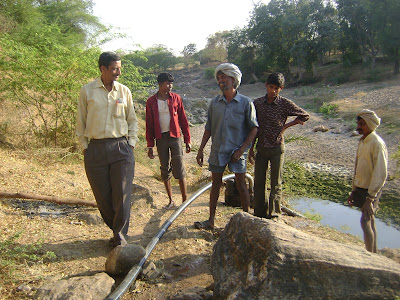Among the many mass actions carried out by the NBA one of the most intriguing is that of occupying government agricultural research farms. They had first done this once on the government farm in Taloon village in Barwani district during the monsoons of 2007. The government had taken a hard line then and arrested the Bhil tribal farmers from Alirajpur who had occupied the farm along with Medha Patkar. They were badly beaten up and sent to jail. However, the NBA took the government to court over this action and the High Court awarded compensation to all the arrested persons stating that it was the duty of the government to give the affected people alternative agricultural land and since it was not doing so it had no right to use violence on the protesting tribals. Thereafter, the NBA continued its struggle for land and also exposed the huge scam being perpetrated by the rehabilitation department of falsely registering land in the name of affected persons without actually handing over possession to them. The concentration on asking for rehabilitation according to the NWDT award has put the government on the backfoot and it is not being able to make much progress with completing the dams.
The NBA has once again launched an occupation movement by barging into the agricultural research farm in Jobat in Alirajpur district from November 2011 onwards. This time round the government has not taken any action whatsoever other than cutting off the electricity supply in the farm. So the occupying tribals have not only stayed put but have grown a very good crop of wheat as is evident in the picture below.
The tribals from the villages on the banks of the River Narmada in Alirajpur district take turns to stay at the farm and carry out all the agricultural activities. The crucial one of course is watering the fields and this is done with the use of a diesel pump. The man currently in charge of operations is Bhaita from Jhandana village. He is diehard fighter and has borne incarceration many times in search of justice. I met him after a long time recently when we visited the Jobat farm to see how things were progressing. Even though I myself look comparatively well heeled in the picture below having desisted from roughing it out in the field over a decade ago, the rigours of this long struggle are quite evident in Bhaita below.



No comments:
Post a Comment